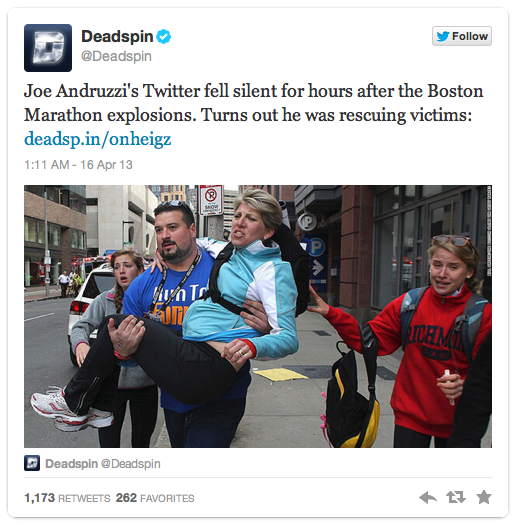The event of Monday's bombings will not soon be forgotten. What happened at the Boston Marathon will be burnt into the memories of everyone around the nation, especially those with families and friends competing. However, what happens when the news breaks five minutes before a journalism class?
The logical choice would be to scrap the lesson plan and to learn from the experience. Cover the breaking news and learn on the fly, much like the reporters on air are doing. But that's not what happened. Instead, in #loweclass we worked on our Milwaukee Neighborhood News Service projects.
I am not blaming #loweclass for working on those projects. They need to get done and be edited in order to be published, which is the overall goal for the assignment. But they were submitted on March 8, the Wednesday before spring break. Today is April 15, more than a month after the due date. If it was such a necessity to have these projects edited in order to be published, why wasn't there more urgency to get these edits done and back to the students so they can do the necessary revisions?
What I am saying is that despite the fact there are stories that needed attending to, a breaking news event such as this needs to be given the utmost importance. This blog post would not be written if today were any regular day. Nine times out of 10 I would have welcomed working on these projects to get them published. But today was not an ordinary day.
News outlets such as Fox News and CNN probably had stories they thought were going to be great and were going to be the lead stories on each respective website. But they trashed those ideas and immediately went to covering the bombings. They had no contingency plan for if a bomb exploded at the Boston Marathon. But they had to cover the story, flying by the seat of their pants, finding out the news and reporting it at the same time to the public. Why wouldn't the class learn how to do the same thing?
We even had one of CNN's senior editors, Mira Lowe, in class last Wednesday. She discussed the "This Just In" blog on CNN, the center for breaking news for the site. Why wouldn't class take a look at this blog when we had just met the person managing the blog? Not only does the class know how the information is being presented, but it knows the person in the newsroom sorting through and publishing that same information. How many journalism students can say that?
#Loweclass is a Journalism III class, an upper level class that focuses on creating stories. So why isn't that class doing journalism when the chance for journalism emerges? We, as students, should have been paying attention to how each news site covers this story. We should have been critiquing what they were doing and discussing how we would have covered the event. But most importantly, we should have been paying attention to how its being covered because it is going to happen again. As much as I hate to say it, there is going to be another tragedy, and we, the future journalists of the world, need to know how to cover a tragedy such as this and have the experience to do so.
The College of Communication preaches that communication and journalism students shouldn't be doing the classes for the grade but for the career. So why were we focused on doing something for the grade, not the career? Maybe it's because I had a friend that was running in the marathon and I was upset he had to be put through something like this. Perhaps it's because the journalist in me wanted to be a part of something that was going to make difference. Or maybe it's just because I hate being out of the loop of information. But overall, I am severely disappointed my journalism class didn't do journalism.
The logical choice would be to scrap the lesson plan and to learn from the experience. Cover the breaking news and learn on the fly, much like the reporters on air are doing. But that's not what happened. Instead, in #loweclass we worked on our Milwaukee Neighborhood News Service projects.
I am not blaming #loweclass for working on those projects. They need to get done and be edited in order to be published, which is the overall goal for the assignment. But they were submitted on March 8, the Wednesday before spring break. Today is April 15, more than a month after the due date. If it was such a necessity to have these projects edited in order to be published, why wasn't there more urgency to get these edits done and back to the students so they can do the necessary revisions?
What I am saying is that despite the fact there are stories that needed attending to, a breaking news event such as this needs to be given the utmost importance. This blog post would not be written if today were any regular day. Nine times out of 10 I would have welcomed working on these projects to get them published. But today was not an ordinary day.
News outlets such as Fox News and CNN probably had stories they thought were going to be great and were going to be the lead stories on each respective website. But they trashed those ideas and immediately went to covering the bombings. They had no contingency plan for if a bomb exploded at the Boston Marathon. But they had to cover the story, flying by the seat of their pants, finding out the news and reporting it at the same time to the public. Why wouldn't the class learn how to do the same thing?
We even had one of CNN's senior editors, Mira Lowe, in class last Wednesday. She discussed the "This Just In" blog on CNN, the center for breaking news for the site. Why wouldn't class take a look at this blog when we had just met the person managing the blog? Not only does the class know how the information is being presented, but it knows the person in the newsroom sorting through and publishing that same information. How many journalism students can say that?
#Loweclass is a Journalism III class, an upper level class that focuses on creating stories. So why isn't that class doing journalism when the chance for journalism emerges? We, as students, should have been paying attention to how each news site covers this story. We should have been critiquing what they were doing and discussing how we would have covered the event. But most importantly, we should have been paying attention to how its being covered because it is going to happen again. As much as I hate to say it, there is going to be another tragedy, and we, the future journalists of the world, need to know how to cover a tragedy such as this and have the experience to do so.
The College of Communication preaches that communication and journalism students shouldn't be doing the classes for the grade but for the career. So why were we focused on doing something for the grade, not the career? Maybe it's because I had a friend that was running in the marathon and I was upset he had to be put through something like this. Perhaps it's because the journalist in me wanted to be a part of something that was going to make difference. Or maybe it's just because I hate being out of the loop of information. But overall, I am severely disappointed my journalism class didn't do journalism.


 RSS Feed
RSS Feed